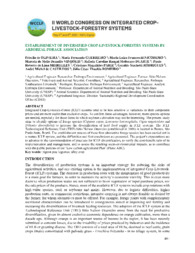Establishment of diversified crop-livestock-forestry systems by arboreal forage association.
Establishment of diversified crop-livestock-forestry systems by arboreal forage association.
Author(s): OLIVEIRA, P. de; GUERREIRO, M. F.; NICODEMO, M. L. F.; VINHOLIS, M. de M. B.; MOLTOCARO, R. C. R.; MEIRELLES, P. R. de L.; PARIZ, C. M.; RODRIGUES, G. S.; CASTILHOS, A. M. DE; ROMEIRO, J. C. T.
Summary: Integrated Crop-Livestock-Forest (ICLF) systems tend to be less sensitive to variations in their component prices and are more stable than exclusive crops. To confirm these advantages, however, more species options are needed, especially for those farms in which soybean cultivation may not be interesting. The present study aims to identify options of forage species (Cajanus cajan, Leucaena leucocephala, Vigna unguiculata and Tithonia diversifolia) to increase the diversification of herd food supply in ICLF systems. The ICLF Technological Reference Unit (TRU) Sítio Nelson Guerreiro (established in 2009) is located in Brotas, São Paulo State, Brazil. The establishment process of these four alternative forage species has been carried out in a mature ICLF system, and the difficulties and first conclusions are presented. The project?s expectations are to advance in the recommendation of practices for ICLF diversification, to verify the cost-benefit ratio of its implementation and management, and to assess the resulting socio-environmental impacts, as to contribute with the public policies of the "Low carbon agricultural Plan" (Plano ABC).
Publication year: 2021
Types of publication: Paper in annals and proceedings
Unit: Embrapa Environment
Keywords: Alley crop, Alley cropping, Legumes, Pigeon peas
Observation
Some of Embrapa's publications are published as ePub files. To read them, use or download one of the following free software options to your computer or mobile device. Android: Google Play Books; IOS: iBooks; Windows and Linux: Calibre.
Access other publications
Access the Agricultural Research Database (BDPA) to consult Embrapa's full library collection and records.
Visit Embrapa Bookstore to purchase books and other publications sold by Embrapa.

